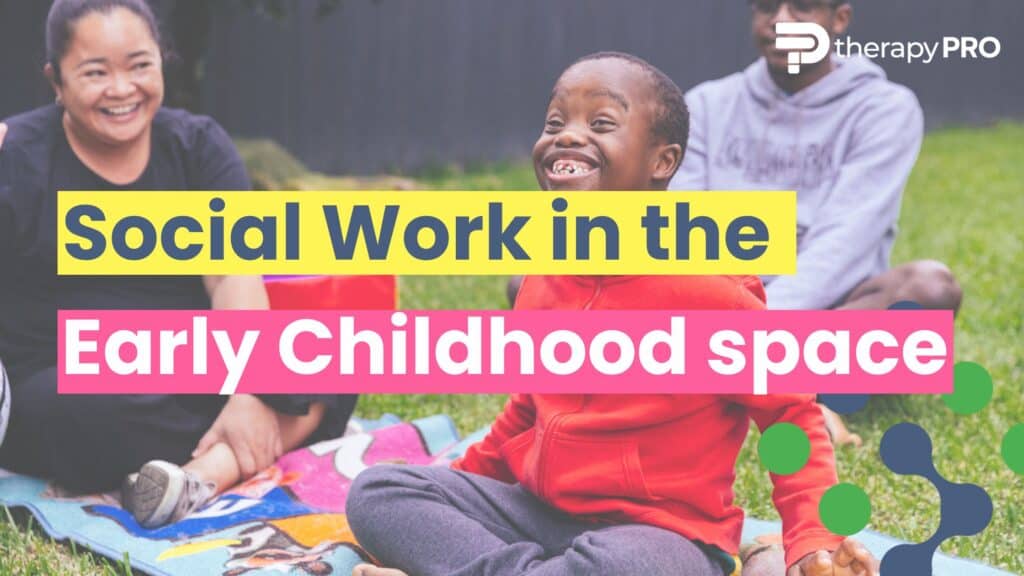Social Work in the Early Childhood Space
To help us dive into social work in early childhood, we asked Natalie, one of Therapy Pro’s social workers for some insights into the profession. Natalie has a special interest in early childhood intervention and support and has over 10 years experience in the sector.
Therapy Pro’s social workers are university-trained allied health professionals, each with a unique background and skillset. Something they all have in common though is their commitment to assisting our clients in connecting and interacting with the world around them.
Our social workers can provide counselling and information to individuals or groups, as well as referrals to other support services. It is commonplace for our social workers to be supporting not only the client, but the family around the client and their support networks. When it comes to social work in early childhood, this is especially the case.
The following delves into social work in the early childhood space: what supporting the child’s network can look like; how to access social work; what some of these services might look like.
If you’re looking for more information about the common misconceptions about social workers then head on over to our related blog which shares a lot more in this space.
What supporting the child’s network can look like in social work
A social worker can help a child and their family build capacity and support greater inclusion in everyday settings; giving the child and family the tools to have the best start in life.
Before the introduction of a social worker, sometimes the only information and support a family has is a diagnostic letter.
A social worker’s role is to inform and support the family, guiding them through these early years. This support can be given in a variety of different ways:
- Through providing knowledge and information to the family.
- Providing emotional support in some cases as initially parents may experience grief and confusion.
- Building the parents’ and families’ capacities to support their child – enhancing the ability of the family to respond to the needs of the child.
- Individualised services, guiding parents through evidence-based support options to find what they would be comfortable with.
- Individualised services, looking at what other supports and services are available.
Best practice in early childhood
Whilst each child is different, there are best practices that our social workers follow.
The primary role of the social worker in early childhood is to work with and support the caregivers. Having the child’s sessions at home with the parents participating, rather than having the session with the child and then handing over to parents, is more beneficial for both. These sessions with the involvement of the caregiver/s should focus on capacity building and providing strategies for the caregiver/s to use.
What does parent and family coaching look like?
Essentially, family coaching is where the social worker will help families decide what goals they want to achieve, choose what strategies they can use to achieve those outcomes, and then build on their capacity to use those strategies and achieve those goals.
Family and caregiver coaching should be an interactive process between the social worker and the family. In the social worker’s role, it is imperative communications with the family are established and clearly align goals and outcomes. This approach allows the caregiver/s and child to figure out what is most meaningful for them to achieve. The social worker will guide the families through these conversations, offering them useful strategies to achieve these goals.
This process is an ongoing one, the social worker will provide strategies, observe, and then reflect with the family.
Other roles of social workers
Providing emotional support for families is another role of the social worker.
Support can be given to the family with educational needs or linked in with other mainstream or community services. A social worker can also assist families in having conversations with organisations such as Child Protection or Child Safety Departments.
A further role of a social worker is to build the capacity of other providers in the child’s life, such as school and childcare. Here, they can educate the child’s other providers, by delivering interventions to support the inclusion of the child, as well as providing knowledge and information to external educators on the child’s diagnosis or capacity.
How to access social work services
The NDIS early childhood approach for children younger than seven years old with a disability or developmental delay allows help for the child and family without a diagnosis of the child. This enables families to build their capacity and ability to support the child to access greater inclusion in everyday settings.
If the child is aged between zero and six social workers can be accessed for Improved Daily Living and Capacity Building under ‘Other Allied Health Professional’. If over seven years old, there is a line item for Social Work, again accessed under Improved Daily Living or Capacity Building.
Social Workers do not diagnose children once they reach the age of seven, however they are able to assist with the process, guiding the family and writing recommendations.
Therapy Pro Social Work
If you or your team would like to attend an informative session on the supports social workers provide, please email [email protected] with your details, number of attendees, and preferred dates.
Follow the links for more information on Therapy Pro’s Social Workers, to see our therapists’ availabilities, or to make a quick referral.




